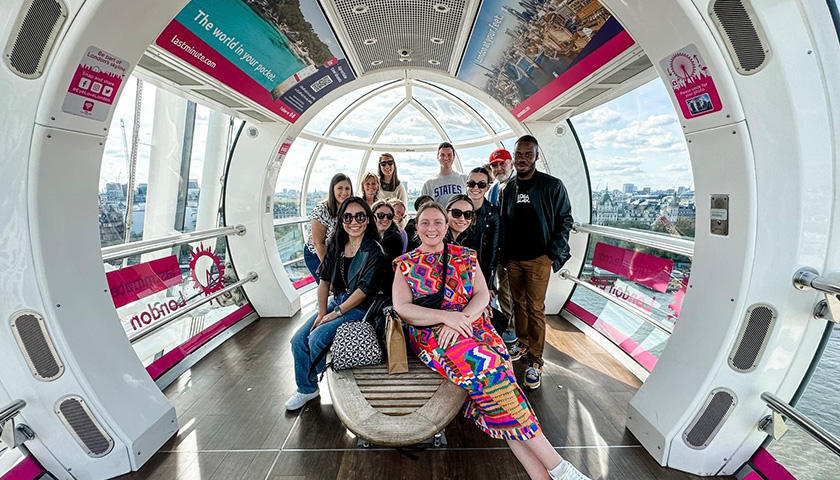Healthcare At Home and Abroad

Sandy Callwood carries around a hefty stack of insurance cards that she needs for herself, her husband, and their three children. Medical. Dental. Prescription savings. Flexible spending account. More than a dozen in all.
That really surprised the healthcare professionals Callwood met during the Sawyer Business School’s annual healthcare global travel seminar to London. As she opened her wallet to show them her various cards, she was greeted with incredulous looks: The UK’s National Health Service (NHS) doesn’t require any cards.
“They don't have that burden, that accountability,” she says. “They're like, ‘No, you just go get what you need and then you leave.’ There is no card. There’s nothing.”
Led by Professors Rick Gregg and Brenda Bond, 11 Sawyer Business School MBA students traveled to England in May to examine the differences between the UK’s publicly funded NHS and the United States healthcare system.
The group spent one week in the London area, learning from representatives of major organizations, including the NHS, the Royal College of Physicians, the Care Quality Commission, the Royal Brompton Hospital, the Health Foundation, the National Institute for Health and Care Excellence (NICE), and University College London Hospitals.
The group also got a chance to be tourists as well, visiting the Tower of London, riding on the London Eye, and enjoying the hoopla surrounding the coronation of King Charles III.
A World of Difference
While George Bernard Shaw described the US and England as two countries separated by a common language, there are huge differences between the healthcare systems as well. For starters, there’s a fundamental difference in philosophy. In the UK, access to healthcare is a right, whereas in the US, access to healthcare is often a privilege, based on one’s insurance coverage.
“It's amazing how the NHS seeks to get people the healthcare they need, when they need it. The access is completely different,” says Caroline Keough, MBA ’24. “So that really struck me.”
One simple solution that impressed both students was the “111” triage line that the NHS runs to give people immediate access to medical assistance and advice, for both their physical and mental health. “That’s a wonderful way to deliver healthcare to most people and keep emergency room and hospital numbers down,” says Keough.
Suffolk’s first healthcare travel seminar in London was held in 2015, and there has been a seminar every year except one since then, with two seminars conducted virtually during the pandemic. Gregg, a longtime healthcare administration professor, says that the insights gained by the students have been invaluable.
“Every year, our students learn from healthcare experts,” says Gregg. “Every speaker inspires the students to think about important aspects of healthcare and how they can be improved, both in England and the US.”
Back home, both Callwood, who works in medical technology, and Keough, who works at a home healthcare company, appreciate the perspective they gleaned from the trip.
“The trip sincerely affected my thinking in terms of access and efficiency in healthcare,” says Keough. “Some of the methods the NHS currently uses could be extremely beneficial to the healthcare system in the US. It was so interesting to see the differences and similarities in the two systems and how different policies could impact populations in each.”
Contact
Greg Gatlin
Office of Public Affairs
617-573-8428
Ben Hall
Office of Public Affairs
617-573-8092



